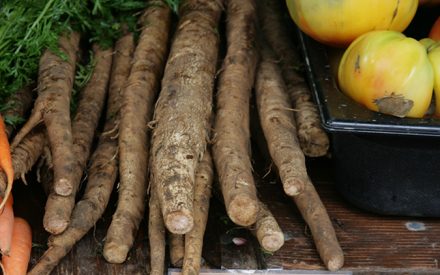Transcript
Welcome. This video is part of the Getting Started in your food or farm business video series. I’m Patrick Nehring, Community Development Educator and Professor for UW-Madison Extension in Brown and Kewaunee Counties.
The food industry has many regulations to protect people from foodborne illnesses and other harm. This video will assist you in identifying the permits, licenses and label requirements that you will need to find out about prior to opening your business and selling your product.
Produce Safety Rule is part of the Federal Food Safety Modernization Act, the Wisconsin Department of Trade and Consumer Protection, also known as DATCP, will be enforcing the prod Produce Safety rule in Wisconsin. DATCP’s safe Wisconsin program emphasizes education prior to compliance with the regulatory requirements. There is a sales exemption for growers or farmers with a three-year average annual produce sales under a certain amount that is adjusted for inflation by the US Food and Drug Administration, the FDA. If the majority of your food sales are direct to consumer, restaurant or retail establishments in the state or within 275 miles or where the food was grown, you may be eligible for a qualified exemption. Commodity exempt produce includes produce that is rarely consumed raw or destined for commercial processing, where the produce will go through a process like cooking, canning, or distilling that reduces the presence of human pathogens. The grower needs to inform the purchaser that the produce has not been adequately processed to reduce microorganisms. Commodity exemption also includes the FDA requirements that they decided not to enforce. As DATCP slowly rolls out enforcement, farms may voluntarily have their name added to the Safe Wisconsin Produce (SWP) Registry to show they are participating in the Produce Safety Rule (PSR).
When selling fresh produce, the farm name and complete business address needs to be included on the packaging. If there’s no packaging, the farm name and complete business address needs to be displayed in some way to the purchaser.
The next section addresses food that is not fresh produce. Food that has been process manufactured or prepared in some way. Licenses are required for most food manufacturing processes, processing, or preparation and there are some exceptions.
A food processing plant license is needed to manufacture, process, and prepare food that is sold wholesale. The food is not sold directly to consumers. Licenses are obtained from the Wisconsin Department of Trade and Consumer Protection.
Licenses need to be attained from the Wisconsin Department of Agriculture, Trade and Consumer Protection to store food. This does not include food that is temporarily stored at a retail store or restaurant where it will be sold shortly.
A retail food license is needed to manufacture process and prepare food that will be sold directly to the consumer. This may be done through a store, restaurant, catering or other location where consumers may purchase directly from the producer of the food. A license can be obtained from the town, village, city, or county where your organization or business food establishment is located or from the Wisconsin Department of Agriculture, Trade and Consumer Protection. Not all municipalities or counties have a health department or someone that provides retail food licensed services. If you are unsure who to contact, start with the clerk of your town, village, or city. If they are unaware of the food retail food licensing process, contact the county clerk or the county health department. If you’re not able to find out about the license from the municipality or the county contact at DATCP. In addition, unless they are selling packaged foods, most food stores, restaurants, and other establishments must have at least one manager or operator certified in food protection practices from a source approved by the Wisconsin Department of Agriculture, Trade, and Consumer Protection.
A mobile food establishment is required to have at least two licenses. One is for the mobile vehicle or pushcart. The other is for the service, base or home base for the operation, the physical location that is used to support the operation. Depending on the operation, other licenses may be needed, such as a food warehouse license. Like with a retail food license, the license for a mobile food establishment and its service base can be obtained from the town, village, city, or county where your organization or business is located, or from the Wisconsin Department of Agriculture, Trade, and Consumer Protection. Also, at least one manager or operator needs to be certified in food protection practices.
For food stands at a special event or promotion that is less than 14 consecutive days, a license can be obtained from the town, village, city, or county where your organization or business is located, or from the Wisconsin Department of Agriculture, Trade, and Consumer Protection. Start with the municipality and the county. At least one manager or operator of the food stand needs to be certified in food protection practices. The municipality or county may offer a food protection manager operator certificate that is only valid to work or volunteer at a transient retail food establishment.
Additional licenses from the Wisconsin Department of Agriculture, Trade and Consumer Protection are needed for dairy, eggs, meat, honey, and maple syrup. There are exemptions to the licensing requirement for some baked goods, canned items, and honey.
There is an exemption to the licensing requirement for home baked goods that is currently being reviewed in the court system. Products need to be baked at a dry heat above 140 degrees Fahrenheit in a closed chamber such as an oven or waffle maker, not a dehydrator. The product needs to be flour-based and does not need to be temperature controlled to prevent the rapid growth of microorganisms. This means that your home baked product cannot include creams, custard, buttercream frosting or cheese because they must be temperature controlled. The baked good must be sold directly to the consumer, not wholesale.
There is an exemption to the licensing requirement for home canned goods, sometimes referred to as the pickle law in Wisconsin. Home canned goods must have a final pH of 4.6 or lower. They may be fruits or vegetables that are naturally acidic. Fruits and vegetables only, no meat or dairy. Not all fruits and vegetables are acidic. For example, tomatoes are acidic, and beans are not. Or they may be fruits and vegetables that are acidic through pickling or fermenting such as sauerkraut. Sales need to be under $5,000 per year, and sales can only take place at community or social events, such as a farmers’ market.
You do not need a license if you’re selling only your honey or bee product and you have not processed the honey or added anything to it. You may heat or strain the honey to package it or you may allow it to crystallize.
Labels for packaged food need to include the name of the product and a list of ingredients from the greatest to smallest weight. Major food allergens need to be listed by the total volume or volume weight of the product and the name and address of the manufacturer, packager, or distributor. Nutrition information needs to be provided, but there are exemptions for the nutrition label requirements for small businesses that do not make a nutrient content claim. A notice must be filed annually with the FDA if you qualify for this. For retailers with annual gross sales under 500,000, and food sales under 50,000, or an importer with fewer than 10 employees and annual sales of less than 10,000 units, a notice does not need to be filed with the FDA.
Home canned foods or home baked items need to state this product was made in a private home not subject to state licensing or inspection. They need to include the date it was produced. Honey labels need to have the grade if graded and the color if it is graded Wisconsin number one. If it is not graded, the packaging needs to state ungraded.
To produce, sell wholesale, or warehouse alcoholic beverages, licenses need to be obtained from the Wisconsin Department of Revenue and the US Alcohol and Tobacco Tax and Trade Bureau. Licenses are based on the type of alcoholic beverage being produced. Licenses are obtained through the Wisconsin Department of Revenue and the Alcohol and Tobacco Tax and Trade Bureau of the US Department of Treasury. Labels on alcoholic beverages need to be approved by the Alcohol and Tobacco Tax and Trade Bureau. The label content varies with the type of alcoholic product.
A license is needed when alcohol is sold or served whether you are charging for it or not. There are different licenses required based on the type of alcohol and if it will be consumed at the location or off site. Licenses are obtained through the town, village, or city where the beverage will be purchased or served. The municipality may provide a temporary license to an organization for a meeting or event.
When alcohol is being served, at least one person present must have an operator’s license, which is also known as a bartender license. To receive an operator’s license from the municipality, an individual needs to be approved by the town board, village board or city council and have completed a responsible server training approved by the Wisconsin Department of Revenue.
The town village or city or county may have a local zoning ordinance. Check with your local town village or city clerk, development department or planning department to see if the type of food manufacturing, processing, preparation, or sales is permitted on your property or the location you intend to purchase or lease. In some towns, the local zoning ordinance is provided by the county. Some activities are permitted uses, and no application is needed. In other cases, you may need to apply for a conditional use permit or a rezoning of the property to allow you to manufacture, process, prepare, or sell your food product.
A seller’s permit from the Wisconsin Department of Revenue is required to sell products or services in Wisconsin. Through the seller’s permit you are required to collect in and forward the state and local sales tax to the Department of Revenue. Some food products are exempt from the sales tax. To be exempt from collecting the sales tax, a nonprofit organization needs to have annual sales of less than $50,000, conduct sales less than 75 days per year, have entertainment costs that are under $10,000, and not be engaged in a trade or business.
On the screen is my contact information if you want to give me a call, send me an email or stop by my office located on the UW Green Bay campus in the Brown County STEM Innovation Center. Additional resources and new information can be obtained for the Wisconsin Small Business Development Centers and state and federal permit licensing agencies that I mentioned.
This and other videos in getting started in your food or farm business video series can be found on farms.extension.wisc.edu.


 Organic Transition: Purpose, Process, and Resources
Organic Transition: Purpose, Process, and Resources Partnerships for Your Food or Farm Business
Partnerships for Your Food or Farm Business Finding the right people
Finding the right people Building a brand
Building a brand


